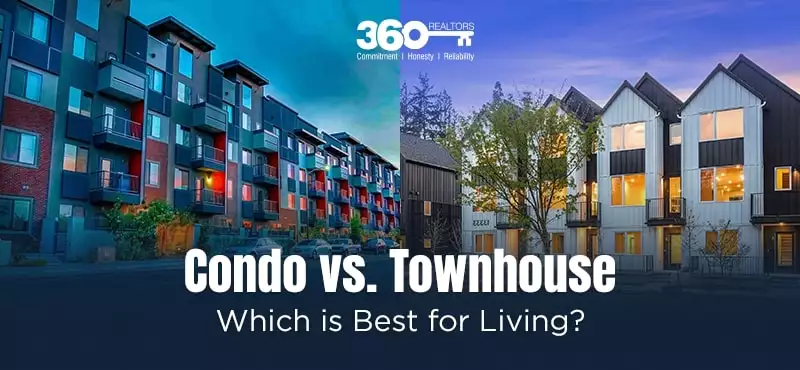The property market looks enticing with different types of houses available for sale. If you are looking for your new home, it’s easy to get confused over the plethora of choices. Apart from residential apartments, bungalows and villas, condos and townhouses continue to be popular housing options. In this guide, we have explained the difference between condo and townhouse for your convenience.
Currently, many property owners with a community-minded philosophy opt for condos and townhouses. Rather than residing in a detached and isolated property or single-family homes, they are settling for these properties in gated communities.
To help you understand what each of these property types means, we have compared condo vs townhouse in this post. This will give you a comprehensive idea about the kind of lifestyle you would lead, along with your share of responsibilities.
In this context, it’s worth noting that neither condo nor townhouse has a strategic advantage over the other. You simply need to choose these types of properties based on your desired lifestyle.
As you look out for new properties in the real estate market, you will come across gated communities with condos or townhouses. You can own both these types of properties, which means, you need not pay rent to the landlord.
However, the ownership experience of these two types of properties is completely different in terms of what you own, the amount you pay, and your responsibility to maintain certain parts of these properties.
In general, condo owners have their individual residential units within a larger complex. On the other hand, townhouses have residential units where the owners might have to share a wall with their neighbours. However, they continue to own the structure of the home along with the surrounding land on the property.
We have discussed the difference between townhouse and condo further below in detail.
Also Read | Condo vs Apartment: Which is Best for Living?
What is a Condo?
Condo is all about living in the apartment style, where you own the space within the apartment walls. However, you don’t own any property outside your apartment. Even the exterior of your apartment or the building doesn’t belong to you. Rather. It is owned and maintained by a separate entity, even though the community enjoys it.
While comparing townhouse vs condo, it’s worth noting that all condos may not be built in the apartment style. Some condo properties are housed within larger gated communities. Not considering the type of residential unit, the ownership norms remain the same. Owners enjoy exclusive rights to the residential unit, but nothing outside or around the property.
Townhouses are properties that resemble traditional houses. However, these are generally multilevel properties and come with a yard both in the front and at the back. These properties aren’t detached, but typically a part of a series or row of homes narrowly designed, attached to each other through walls.
In the case of a townhouse, owners reserve the exclusive right to both the interiors and exteriors of the property, along with the apartment where the property sits. This brings you the responsibility of maintaining the property, both internally and externally. This is the key difference between condo and townhouse.
Also Read | Flat vs Apartment
Condo vs Townhouse: What to Expect When You Buy One?
Now that you know the basic difference between a condo and a townhouse, let’s take a look at some of the crucial factors when you own one of these types of properties.
As a condo owner, you own the space within the property. However, someone has to take care of the elevators, hallways, and common areas outside the unit, right? This responsibility is entrusted to a homeowners association (HOA). This body is responsible to take care of the property and manage it.
Now, since the condo owner enjoys the benefits of this maintenance carried out by the HOA, they need to pay a regular fee to the body. The HOA is also responsible for formulating a set of rules, which condo owners need to comply with.
As we compare townhouse vs condo, it’s important to understand that townhouses are properties owned privately. However, they are still a part of a larger complex or gated community that has an HOA. In the case of townhouses, the HOA isn’t responsible for maintaining the individual residential units. However, they oversee the condition of the community as a whole.
Besides, some HOAs for townhouses establish a set of guidelines that the property owners need to follow. They also charge a fee for services like trash removal or garbage disposal. Even some HOAs formulate rules for townhouse owners that require them to maintain the look and feel of the community. If a townhouse is classified as a condo, the norms may turn out to be even more restrictive.
While discussing the difference between condo and townhouse, it’s imperative to get a clear idea regarding the associated fees and costs. Compared to detached homes, both these options are more affordable since they come with living arrangements designed around a community. However, owners notice a difference in cost between condos and townhouses.
Compared to townhouses, condos are cheaper since the ownership of these properties is limited to only the interiors of the apartments. Therefore, condo owners have fewer financial liabilities like property insurance and tax since they use a lesser area in terms of square units compared to townhouse owners. Also, they need not pay any insurance premium on the rest of the complex or building.
For townhouse owners, the financial liability turns out to be greater since they need to pay more property tax and insurance. However, the HOA fees for townhouse owners are often lower since the owners take care of their properties. This implies fewer community expenses compared to condos.
Condo owners need to contribute to all the repairs and improvements they make in the interiors of the property. Besides, condos sometimes offer different amenities to property owners that are funded through the common charges that are paid on a monthly basis.
Both condo and townhouse owners benefit from the community or complex, shaping their lifestyles. Compared to detached homes, the lifestyle in condos and townhouses is more communal. While comparing townhouse vs condo, it’s crucial to take note of these differences.
In general, condos are smaller in size and there’s no private space for outdoor use. However, in urban areas, condos offer some strategic benefits in terms of convenience to the owners. Most buyers choosing condos prioritize the wide range of amenities they enjoy in the complexes. These include fitness centres, security personnel, spaces for events, a swimming pool, and playrooms. Besides, some modern condos come with amenities like bowling alleys, screening rooms, and rock-climbing walls. The HOAs in charge of these complexes create appealing opportunities for the owners, so that they get to know their neighbours better.
In townhouses, families enjoy a lifestyle similar to the one in single-family homes. They enjoy private space outside their homes. For instance, most townhouses in gated communities come with yards where children can play and neighbours can socialize with each other. This brings a rewarding experience for townhouse owners. Owners enjoy a greater level of privacy compared to condo owners, but they lack shared amenities to a certain extent.
While discussing the difference between townhouse and condo, potential buyers must understand the rules, regulations, and their responsibilities.
For condo owners, the level of responsibility tends to be less since they aren’t responsible for maintaining their own residential units. The HOA of condos takes care of these tasks. For instance, if there’s a leaking roof in a condo, you need not fix it as the owner. Rather, the HOA is responsible for replacing the roof since it comes under maintenance. Likewise, they are responsible for fixing plumbing issues and other tasks that require maintenance.
This gives the impression that condo owners have minimal burden of responsibilities. However, owners need to adhere to the norms established by the HOA. This body is responsible for ensuring that the condo owners peacefully coexist in the complex. Thus, they might impose restrictions on noise levels or limit the use of units. The value of the entire unit depends on the value of each condo unit. Besides, owners often face restrictions when it comes to remodelling condos.
Responsibilities for townhouse owners are greater compared to condo owners, similar to the liabilities of detached homeowners. Therefore, if you own a townhouse, you will be responsible for maintaining every aspect in and around your home, along with the plot where the property is located. In some cases, the HOA may arrange for garbage disposal or have the snow plowed. However, each owner is responsible to fulfill certain aesthetic standards in the property.
The HOA may impose restrictions in townhouses too. For instance, they might regulate the frequency at which you may now the lawn. Even, you need to stick to their regulations when it comes to maintaining landscaped gardens or painting the exterior of your home. The HOA may decide the type of fences you can install to maintain the overall decorum of the property.
When you compare townhouse vs condo in terms of financing options and resale value, you will notice certain differences. Of course, when you hold a property, it is likely to deliver a higher resale value. However, it’s crucial to know the type of property that can be more profitable to you in terms of ROI.
Now, the resale value of your home largely depends on the extent of care you can take for it. Upgrade and maintenance also determine the resale value of a property. In this context, townhouse owners are better poised to use their freedom and take care of the property. On the other hand, condo owners can only control the condition of the internal structure of the unit.
When you purchase a condo, make sure that it’s situated in a complex where the HOA properly takes care of the property and maintains it. Unless the complex is properly maintained, owners might find it challenging to find new buyers for their condo units.
When it comes to financing the property, owners might find it challenging to obtain loans to purchase a condo unit. This may also impact the resale value of this type of property in the future.
Now that you know the difference between townhouse and condo, you can decide on the type of property that suits your lifestyle. Rather than comparing the benefits of each of these categories, consider how you would like to live with your family or individually in the complex. Prioritize aspects like privacy, convenience, and affordability while choosing between a condo and a townhouse.
If you happen to be a first-time property owner, condos might turn out to be the right option. These units offer the convenience of living, although you aren’t responsible for maintaining the property. However, for growing families, townhouses will be a better choice with adequate outdoor space to socialize or let your children play. A closely-knit community style proves to be more important in these conditions.
FAQs
If you are interested in buying a condo or a townhouse, reach out to one of the reputed property agents. The professionals will help you find a property in the desired area and guide you in choosing a reputed developer.
Although condos and townhouses are different from one another in many ways, both are regulated by an HOA and the owners need to shell out an HOA fee. Besides, both condos and townhouses are more affordable compared to traditional houses.Â
While comparing condo vs townhouse in terms of investment, it’s imperative to consider your financial situation. Condos may be cheaper, but you also need to prioritize your lifestyle. Townhouses come with better resale value, which makes them a better choice.
Condo units are usually cheaper compared to townhouses since you would own only the internal structure of the property. These properties don’t have any land around them. However, it’s crucial to know the ongoing expenses like the HOA fees that you may have to bear.






